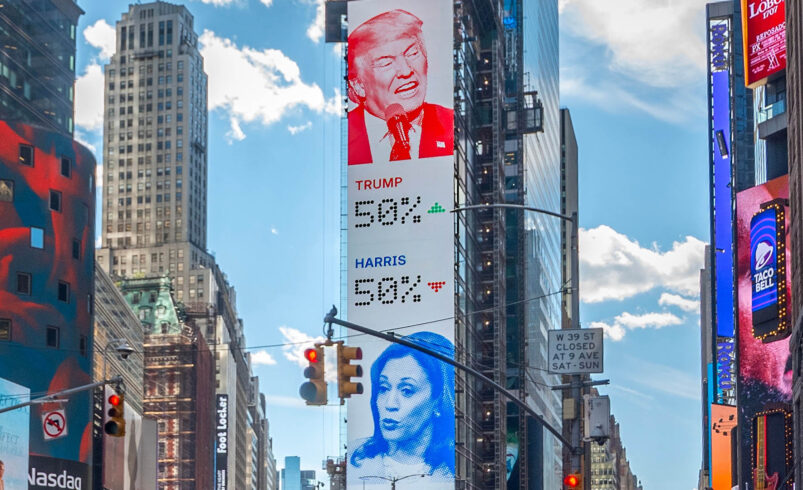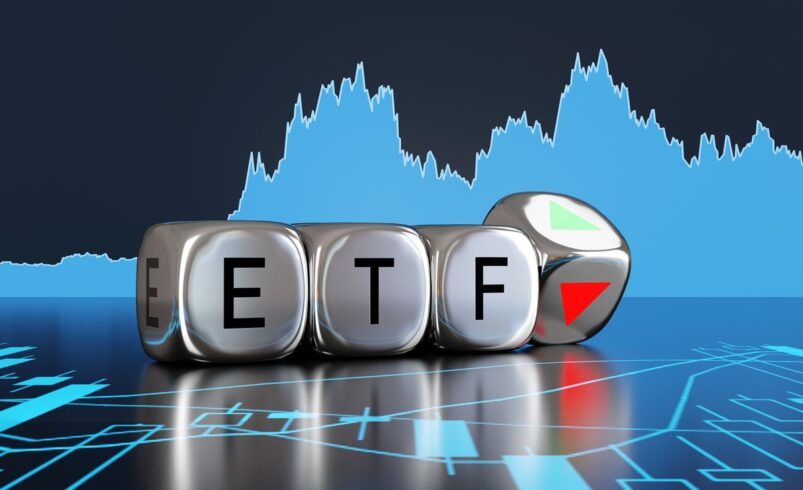
Trump vs. Harris Presidential Race 2024: U.S., Japanese Stock, and the Crypto Market Impact
The potential presidential race between former President Donald Trump and Vice President Kamala Harris in the 2024 U.S. election introduces a range of scenarios that could significantly impact global markets. As these two prominent political figures pursue the highest office, their policies, positions, and likely administration strategies will shape investor expectations and influence sectors from U.S. and Japanese equities to cryptocurrencies. Let’s dive into how a Trump vs. Harris election could affect these markets, from traditional stocks to emerging digital assets.
1. Impact of a Trump vs. Harris Presidential Race on the U.S. Stock Market
A Trump vs. Harris race presents two very different policy outlooks, each with distinct implications for U.S. markets. If Trump prevails, the market may see a return to his previous policies, favoring deregulation and tax cuts. For Harris, investors expect her policies to mirror those of the current administration, prioritizing social spending, renewable energy, and tax adjustments for corporations.
- Trump’s Potential Impact: Likely to boost financials, small-cap stocks, and possibly certain energy sectors due to his preference for deregulation and support for traditional energy. Corporate tax cuts could drive profit growth, encouraging investment in large-cap and small-cap U.S. stocks.
- Harris’s Potential Impact: Expected to favor sectors like healthcare, renewable energy, and housing due to her proposed social initiatives. Higher corporate taxes, however, could add short-term pressure on earnings and lead to a revaluation in some large-cap stocks.
2. Sector-Specific Effects Under Trump and Harris
Under each candidate, certain sectors could outperform or face pressure. Here’s a closer look at how Trump and Harris’s policies might shape key sectors:
- Finance: Trump’s policies could spur growth in regional banks and finance, while Harris might advocate stricter regulations, especially on large banks.
- Technology: Both administrations would likely maintain high support for the tech sector, though Harris could support additional regulations, especially around data privacy and security.
- Healthcare: Harris may boost healthcare through expanded coverage initiatives, while Trump’s policies may favor privatization efforts, benefiting certain private healthcare and pharmaceutical stocks.
3. U.S. Dollar Outlook and Its Effect on Markets
Both candidates’ fiscal policies could influence the dollar. Trump’s spending policies might pressure the dollar downward, supporting asset prices for commodities and multinational firms reliant on exports. Harris’s proposed taxes may support a stable dollar but could restrict short-term growth. A weaker dollar under Trump could attract investment in U.S. stocks, especially for companies with global earnings.
4. Potential Changes in U.S.-Japan Relations
U.S.-Japan relations impact not only the Nikkei 225 but also Japan’s export sectors and trade stability. Trump has historically promoted America-first policies, pushing for more balanced trade agreements with Japan. A Trump presidency could lead to a weakened yen, beneficial for Japanese exporters. Conversely, Harris might maintain a steady trade policy similar to the current administration, stabilizing relations and minimizing direct impact on the yen.
5. Impact on Japanese Stock Market and the Yen
The Japanese stock market, represented by the Nikkei 225, often reacts to changes in U.S. economic policies and the dollar-yen exchange rate. A Trump victory could create a weaker yen, which would support Japanese exporters and potentially drive up the Nikkei 225. On the other hand, a Harris administration may keep the yen stable or even stronger, which could create mild pressure on Japanese stocks.
6. Why U.S. Policy Changes Affect Japan’s Stock Market
Japan’s economy is heavily export-driven, making the yen’s valuation crucial for corporate profits. Policies that weaken the yen make Japanese goods more competitive, bolstering profitability and stock prices. With Trump’s potential policies encouraging a weaker dollar and yen, we may see a rise in Japanese exports, benefiting automakers, electronics, and other export-heavy industries.
7. Implications for Japan’s Export-Heavy Industries
If the yen weakens under a Trump presidency, expect growth in industries like automotive, consumer electronics, and industrial machinery. Harris’s likely stability-driven approach may see less fluctuation, creating a more predictable but possibly slower growth trajectory.
8. Investor Sentiment and Market Volatility During Election Cycles
Presidential races typically spark market volatility. Historical trends show that markets experience short-term swings as investors react to potential changes. The unique clash of ideologies between Trump and Harris means sentiment could be polarized, with volatility particularly acute in sectors directly affected by their policies.
9. How a Trump Victory Could Affect the Crypto Market
A Trump win might indirectly benefit the crypto market. Trump’s favoring of loose monetary policy, coupled with skepticism toward central bank policies, may push investors toward decentralized assets like Bitcoin. A weaker dollar under Trump could drive further demand for Bitcoin, Ethereum, and other alternative stores of value.
10. How a Harris Presidency Could Shape Cryptocurrency Regulation
Harris’s administration may lean towards a regulatory framework for cryptocurrencies, potentially tightening the environment but also adding legitimacy. This might attract institutional investors who have awaited regulatory clarity. Her support for innovative technology and digital finance, however, might counterbalance any regulatory impact, encouraging a structured but growing crypto landscape.
11. Why Market Volatility May Spike in the Crypto Space
Cryptocurrencies are highly sensitive to policy changes, and as both candidates propose different approaches to regulation and monetary policy, volatility in this space could increase. A contested election could also drive temporary demand in crypto markets as investors seek safe-haven assets.
12. Cryptocurrency Adoption and Regulatory Outlook
Both Trump and Harris could contribute to the development of digital assets but through contrasting lenses. Trump’s skepticism toward regulation might spur interest in decentralized assets, while Harris’s balanced approach may create a more structured growth pathway for stablecoins and Central Bank Digital Currencies (CBDCs).
13. International Relations, Trade, and Market Impacts
Both Japan and the U.S. depend on stable trade and foreign exchange rates. The election results may affect foreign relations and trade policies, particularly in the Asia-Pacific region. Investors should pay attention to any hints of new trade agreements or tariffs that might arise under either presidency.
14. Preparing for Investment Opportunities Amid Election Volatility
With potential market fluctuations around election outcomes, investors should consider diversified portfolios that hedge risks across equities, fixed-income assets, and digital assets. Exposure to sectors that benefit from specific policies, along with alternative assets like gold and cryptocurrencies, could create balanced returns amid market uncertainty.
15. Conclusion: Key Takeaways for Investors in Stocks and Cryptocurrencies
The 2024 election race between Trump and Harris could lead to divergent market outcomes in the U.S., Japan, and the cryptocurrency space. Investors should prepare for varying levels of volatility, sector-specific effects, and evolving regulatory landscapes. Balancing between high-growth sectors and defensive assets could prove beneficial. Whether focused on traditional stocks or digital assets, diversifying across regions and sectors is key to navigating the shifting dynamics of this election season.













